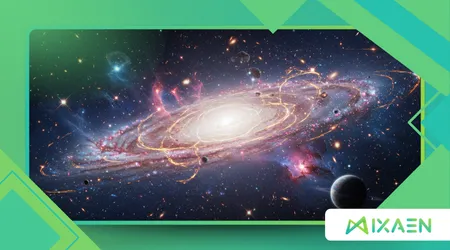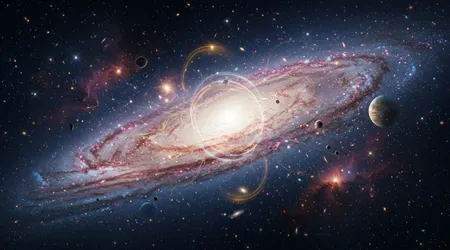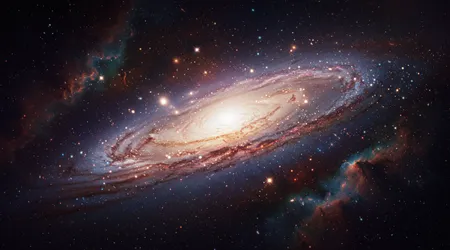What If the Universe Is Conscious?

Universe is conscious? This provocative question ignites curiosity, blending science, philosophy, and spirituality.
Anúncios
Could the cosmos possess awareness, intention, or even purpose? The idea challenges our understanding of reality, pushing boundaries beyond traditional physics into realms of speculative thought.
Recent discussions in cosmology, neuroscience, and philosophy fuel this debate, with thinkers exploring consciousness as a fundamental cosmic trait.
This article dives into the concept, weaving hard science with imaginative inquiry, offering a fresh perspective on existence itself.
Why does this matter? The notion of a conscious universe reshapes how we view our place in it. It’s not just academic it’s deeply personal.
From ancient philosophies to cutting-edge theories, the idea sparks wonder and skepticism alike.
Join us as we explore the evidence, implications, and unanswered questions, grounded in reason yet open to awe. Let’s unravel this cosmic mystery together, step by step, with clarity and curiosity.
The Roots of Cosmic Consciousness
The concept that the universe is conscious? traces back to ancient traditions. Panpsychism, the belief that all matter holds some form of consciousness, appears in early Hindu texts and Greek philosophy.
Thinkers like Anaxagoras proposed a cosmic “mind” ordering reality. These ideas, though metaphysical, resonate with modern questions about awareness.
++ The Nature of Infinity: Can the Universe Be Infinite?
Today, panpsychism gains traction among philosophers like David Chalmers. He argues consciousness might be a universal property, not exclusive to brains.
This view suggests even particles could possess rudimentary awareness, forming a cosmic web of sentience. It’s a bold leap, but it aligns with holistic perspectives from indigenous cultures.
Skeptics counter that consciousness requires complex systems, like neural networks. Yet, the universe’s vast complexity galaxies, black holes, quantum fields might mirror such systems.
Could intricate cosmic patterns suggest a form of awareness? The question lingers, blending ancient wisdom with modern speculation.

Scientific Perspectives on Cosmic Awareness
Can science weigh in on whether the universe is conscious? Physics offers clues but no definitive answers.
The integrated information theory (IIT), proposed by neuroscientist Giulio Tononi, measures consciousness by information integration. Applied to the cosmos, IIT suggests vast systems could exhibit awareness.
A 2023 study in Nature explored IIT’s implications, finding that complex networks, like galactic clusters, share traits with neural systems.
While not conclusive, it hints at cosmic-scale information processing. Still, critics argue consciousness demands more than complexity it needs purpose or experience.
Quantum mechanics adds intrigue. The observer effect, where observation alters outcomes, suggests a link between mind and reality.
Also read: The Arrow of Time: Why Does Time Move Forward?
Could the universe “observe” itself? This speculative bridge between physics and consciousness keeps the debate alive, urging deeper exploration.
Consider the cosmic microwave background radiation, a snapshot of the universe’s infancy. Its patterns suggest order, not chaos. Might this order reflect a purposeful intelligence? Science doesn’t say yes—but it doesn’t say no either.
Philosophical Implications of a Sentient Cosmos
If the universe is conscious?, philosophy faces a paradigm shift. Traditional views place humans as unique conscious beings.
A sentient cosmos challenges this, suggesting we’re part of a larger mind. Philosopher Thomas Nagel argues we must rethink subjectivity itself.
This idea disrupts ethics. If stars or galaxies hold awareness, do they deserve moral consideration?
Imagine respecting a nebula’s “perspective” it sounds absurd, yet it forces us to redefine value. Consciousness at a cosmic scale blurs lines between self and other.
Existential questions arise too. Does a conscious universe have a goal?
Read more: The Holographic Principle: Is Our Reality a Projection?
Teilhard de Chardin’s “Omega Point” theory posits a cosmic evolution toward ultimate awareness. Such ideas, while speculative, inspire us to ponder our role in a potentially mindful cosmos.
The anthropic principle adds weight. Our universe’s fine-tuned constants suggest it’s “designed” for life. Could this reflect a conscious intent?
The question invites us to see existence as more than random chance, sparking profound reflection.
Consciousness and the Universe’s Structure
The universe’s architecture fuels speculation about whether the universe is conscious? Its vast networks galactic filaments, neural-like structures mirror brain connectivity.
A 2024 Scientific American article noted similarities between cosmic webs and neural networks, suggesting shared organizational principles.
| Aspect | Brain | Universe |
|---|---|---|
| Connectivity | Neural networks | Galactic filaments |
| Information Processing | Synaptic signals | Gravitational interactions |
| Scale | Micro (neurons) | Macro (galaxies) |
| Complexity | ~86 billion neurons | ~100 billion galaxies |
This table highlights eerie parallels, but correlation isn’t causation. Still, the universe’s ability to process information through gravity and radiation raises questions. Could it “think” in ways we can’t grasp?
Example: Imagine a galaxy cluster as a cosmic “neuron,” exchanging energy with others. If billions interact, might they form a collective awareness? It’s a thought experiment, not proof, but it captivates.
The universe’s expansion, driven by dark energy, adds another layer. If it’s purposeful, what’s the intent? This question, unanswerable yet, pushes us to explore beyond empirical limits.
Cultural and Spiritual Dimensions
Across cultures, the idea that the universe is conscious? resonates deeply. Indigenous beliefs often view nature as alive, imbued with spirit.
The Gaia hypothesis, proposed by James Lovelock, echoes this, suggesting Earth itself might be a conscious system.
Modern spirituality embraces cosmic consciousness too. Movements like New Age philosophy see the universe as a unified mind, with humans as fragments of it. This aligns with Advaita Vedanta, where all is one consciousness.
Contrast this with materialist views, which dismiss cosmic awareness as anthropomorphic projection.
Yet, even skeptics admit the universe’s mysteries like dark matter’s role leave room for wonder. Could cultural stories hold truths science hasn’t yet grasped?
Analogy: Picture the universe as an ocean, with each galaxy a wave. If the ocean “knows” itself, do waves share that awareness? This perspective bridges spiritual and scientific inquiry.
Challenges and Criticisms
Skepticism about whether the universe is conscious? is robust. Critics argue consciousness requires biological systems, not cosmic ones.
Brains have neurons; galaxies don’t. This materialist stance demands empirical proof, which panpsychism lacks.
Another challenge is measurability. How do you test cosmic consciousness? Without observable markers, it’s speculative. A 2024 Neuroscience Letters paper emphasized that consciousness studies struggle even with humans, let alone universes.
The anthropomorphic trap looms large. Humans project intent onto nature think of seeing faces in clouds. Is cosmic consciousness just a grander version of this? Critics say yes, urging caution.
Still, dismissing the idea outright ignores the universe’s unexplained complexities. Black holes, for instance, process information in ways we barely understand. Could they contribute to a cosmic mind? The debate persists.
Practical Implications for Humanity
If the universe is conscious?, what does it mean for us? Practically, it could reshape science. Researchers might prioritize studying cosmic information flows, seeking patterns akin to neural activity. This could unlock new technologies.
Ethically, it challenges our worldview. If the cosmos is sentient, exploiting resources like mining asteroids might carry moral weight. Imagine treaties protecting “conscious” celestial bodies. It’s far-fetched but thought-provoking.
Example: Picture a future where AI detects cosmic signals suggesting intent. Diplomacy with the universe? It sounds sci-fi, but it sparks creative problem-solving.
Psychologically, the idea fosters humility. We’re not separate from the cosmos but part of it. This could inspire sustainable living, aligning with a “mindful” universe’s rhythms.
The Future of Cosmic Consciousness Studies

Where does the question of whether the universe is conscious? lead next? Interdisciplinary research is key.
Neuroscience, cosmology, and philosophy must converge. Projects like the Simons Observatory, studying cosmic backgrounds, could offer clues.
AI advancements might help. Machine learning could model cosmic networks, testing if they mimic conscious systems. A 2025 MIT Technology Review report highlighted AI’s role in decoding complex cosmic data.
Public interest is growing too. X posts in 2025 show rising curiosity, with #CosmicConsciousness trending. This cultural shift could drive funding for bold research.
What if we’re on the cusp of proving the universe thinks? This question, once fringe, now fuels cutting-edge inquiry, blending wonder with rigor.
Conclusion
The question is the universe conscious? stirs the imagination while grounding us in science and philosophy.
It’s not about definitive answers but exploring possibilities. From ancient wisdom to modern theories, the idea challenges our assumptions, urging us to see the cosmos as more than matter.
Whether it’s panpsychism, quantum oddities, or cultural narratives, the debate enriches our understanding.
As we probe deeper, we might find not just a conscious universe but a deeper connection to it. What do you think could the stars be watching us back?
Frequently Asked Questions
Q: Is there scientific proof the universe is conscious?
A: No definitive proof exists. Theories like IIT suggest possibilities, but consciousness remains hard to measure, especially at cosmic scales.
Q: How does panpsychism relate to cosmic consciousness?
A: Panpsychism posits all matter has consciousness. It suggests the universe could be inherently aware, though evidence is speculative.
Q: Can AI help study cosmic consciousness?
A: Yes, AI can model complex cosmic networks, potentially revealing patterns akin to consciousness, as explored in recent 2025 research.
Q: Does a conscious universe change daily life?
A: It could inspire ethical shifts, like sustainable practices, and drive new scientific inquiries, impacting technology and philosophy.
